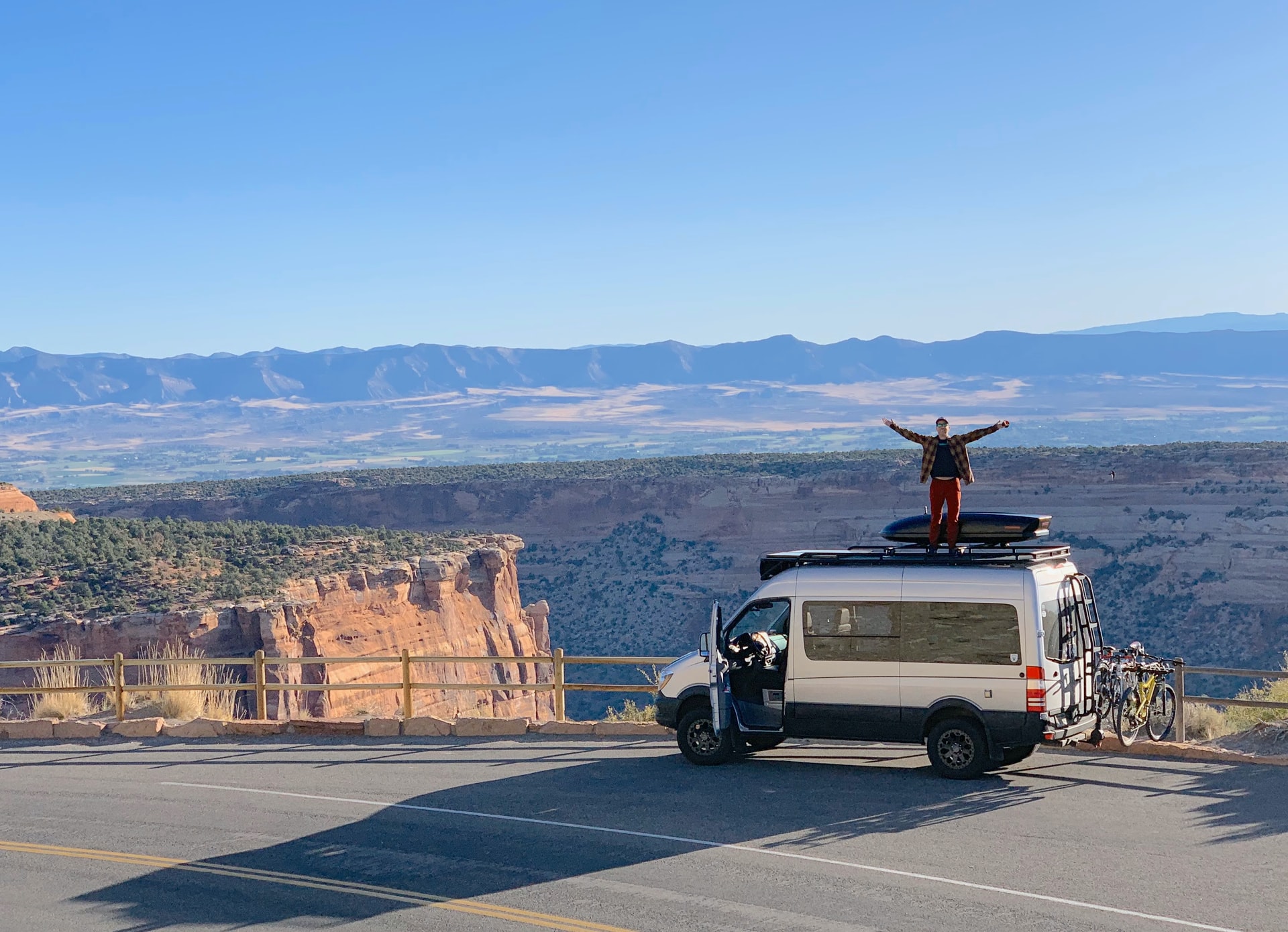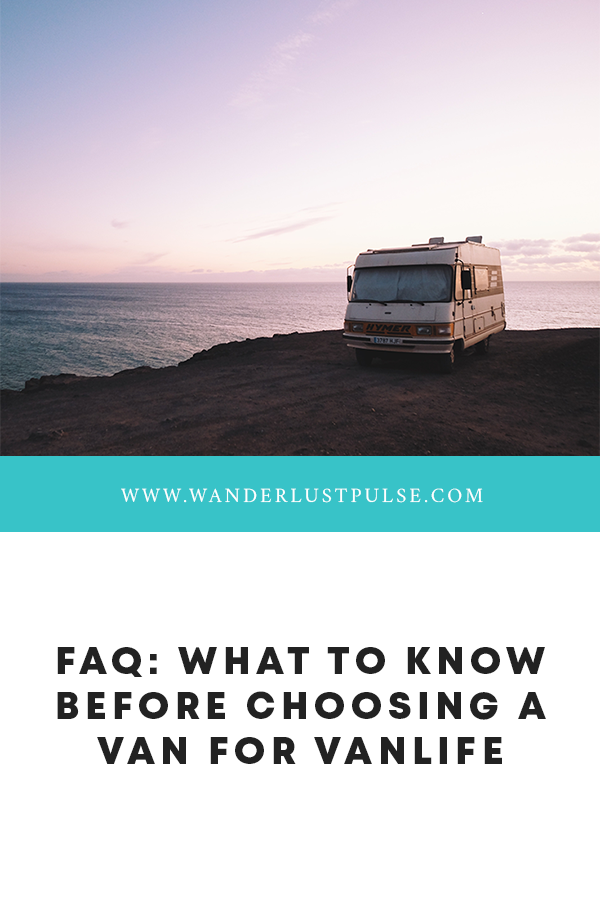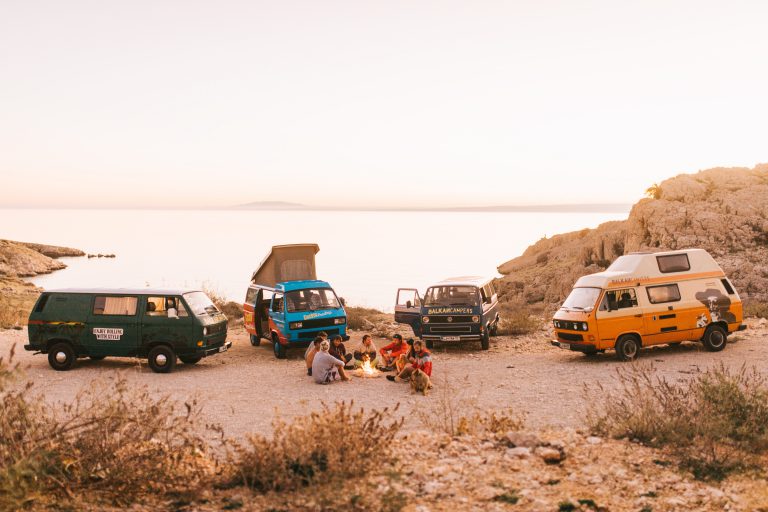FAQ: What to know before choosing a van for vanlife
Let’s be honest, who hasn’t thought about buying a campervan with the goal to conquer the world, travel to the most idyllic places, and live the vanlife?
I’m sure we all have!
However, it takes effort to find the right van, which is why we are happy to list some points you might want to consider before buying a van. In case you’re still doubting which van might fit you best, we’ve listed the most popular campervans for traveling the world as well.
Page Contents
Used or new campervan?
While it might be financially advantageous to buy a second-hand van to convert into a camper van, the downside compared to buying a completely new van that just rolled off the factory line is the fact that you don’t know how respectful and cautious the previous owners have been with the vehicle. They might have sold their van because of recurring mechanical issues or because of high fuel consumption.
Theoretically, you can also buy a second-hand campervan, but then you might even find more hidden disconnects, since you would have no clue how the van is wired, if the plumbing is solid, or if they used quality insulation.
If the purchase price is not that expensive, it’ll be easier to take a gamble and take the risk. However, if you’re looking at a big investment, it would be wise to have it inspected by a mechanic before you do the actual purchase.
The disadvantage of buying a van to convert it yourself is the high purchase price and the fact that you have no experience in building a campervan (yet).
Before you can approach a mechanic to get his opinion, you’ll first have to find the right van. That’s why we have made an overview of the various points that play a role in your search.
The dimensions: does size matter?
When you’re looking to buy a van, one of the most important factors you’ll have to think about is the dimensions of the van. Since you’ll be living full-time in your van, the things you plan to do on a daily basis and the places you’ll want to visit determine what size of van you should buy.
To put the dimension a bit more in perspective, we have made an overview with the different sizes.
Small vans. When we talk about small vans, we are talking about minivans meant for hauling around kids and gear. They won’t fit a shower or a kitchen, but don’t be mistaken: a LOT of people have turned them into homes as well!
The advantage of a small van is that they’re easy to maneuver, while finding the perfect parking spot isn’t a difficult search either
Medium vans. ‘Medium sized’ vans or ‘extended minivans’ aren’t very popular in the vanlife community, this is because vandwellers tend to be one step bigger (for more luxury) or one step smaller (for the maneuverability).
Large vans. Most construction companies and plumbers have a large cargo van, and these are actually ideal for vandwellers who’re looking to build a bigger camper van. You’ll have the possibility to include a kitchen and maybe even a shower.
Extra large vans. The extra space you get with an extra large van is everything you’ll need to create a more luxurious build. This is because the extra space will mainly go to the storage and living areas. It might even allow you to create space to bring your bikes, or have a cozy corner.

Mileage and age
The amount of kilometers a van has done is a great indication for the amount of maintenance and repairs it might need. While it is only logical that an intensively used van will have more costs, this isn’t always a fact: some vans can take a lot of kilometers before anything drastic needs replacing.
Two other aspects you might want to consider:
- Most cities are introducing a ‘Low Emission Zone‘, in which they fine heavily-polluting diesel vehicles. The amount of this fine is sometimes linked to the age of the car.
- If you’re buying an older van, the costs for maintenance might be higher because of the fact that there are fewer spare parts to be found.
In general, we keep these numbers in mind when searching for a new van:
- Petrol vans will start to fall apart at 250.000 km
- Manual transmissions need replacing after 400.000 km
4WD or RWD?
When you’re buying a new van, you’ll have the option to choose for a van with four-wheel-drive, which is capable of putting force on all its wheels simultaneously. This can come in handy when you’re planning to go camping in remote places and drive off the beaten path.
The downside of 4WD is that it’s more expensive, although a two-wheel-drive has more limitations to explore remote areas and back roads. For example: a 4WD camper van is better suited to ride uphill and through the snow, while a 2WD will need more effort to carry the same amount of weight uphill.
Gas vs Diesel
Gas vs. Diesel. While Diesel camper vans are more expensive to buy and fix, they have a better fuel economy, higher torque, more power, and last longer. However, as already mentioned: the bigger cities are introducing ‘Low Emission Zones’, in which they fine diesel vehicles of a certain age because they are more polluting.
The more seats, the bigger the party
A crucial aspect when picking the size of your camper van, is the amount of people that are going to join you for the trip. In most European countries there are strict safety rules in which the number of passengers is limited to the amount of official seats in the car.
In practice, if you want to go for a roadtrip with more than two passengers, your van will have to contain a second row of seats.
Facilities and comfort
While minimalists just need a simple bed to sleep in, other vandwellers might want a toilet, others prefer a shower, a fridge or a kitchen. All these facilities have an impact on the size of the van you’ll need, so it’s best to check in advance which facilities you’re looking to include in your van.
The final destination
We have already mentioned it a few times between the lines, but the destination you’ll want to visit will also impact the van you will want to choose: Next to local environmental laws (such as low emission zones) play a major role, but also the environment which your van will need to conquer: from a big mountain with small roads, to a dusty pavements next to a cliff.
Height?
The last decision you’ll have to take, but definitely not least is the height of your van. This choice is going to set you up for long term happiness, or a life of discomfort. Living in a van which is too low is going to be inconvenient and will – no matter what – bring frustrations.
People who’ve picked a smaller size of van will probably not care about the height of their van, since it’s not meant to stand up. However, vandwellers who’re looking for a longer van (because they can’t miss their daily shower for example), will be more sensitive to this point.
Think before you buy
Buying and converting a van into a camper van usually comes with a hefty price tag, so it would be absurd to buy the first van you come across without having considered your wishes and needs. Take your time and reflect!
If you’re still doubting which van might fit you best, we listed the most popular campervans for traveling the world.









